Curated OER
Scientific Classification
In this scientific classification worksheet, students read about classification and the questions scientists ask in order to classify, then read about features of different classifications of animals. Worksheet is informational, no...
Curated OER
For Creative Minds: What Makes an Animal a Mammal?
Students read about categories of mammals and their features. Students then construct a marine animal, using given print outs in the lesson. Students then create adaptations for their mammal, using a web site reference for guidance.
Curated OER
World of Protists
Students observe a jar of pond water and predict how much life they think exists in the jar and watch a "Bill Nye: The Science Guy" video regarding protists. They participate in an online virtual pond dip where they begin to familiarize...
Curated OER
Viewing Viruses
Students view the characteristics of viruses following the 5-E learning model. By participating in discrepant events Students observe the impact of viruses over humans. By participating in discussion students examine the characteristics...
Curated OER
Algal Blooms
For this algal blooms worksheet, students order the stages of a red tide. They answer two short answer questions. Students define three terms relating to algal blooms.
Curated OER
Ionic Compounds
In this ionic compounds worksheet, students identify the number of electrons gained or lost in ions, they show that transfer of electrons in ionic compounds and they write balanced ionic compounds given ions. They answer 4 questions...
Curated OER
Microscope Investigation
Young scholars explore physical science by participating in a science examination. In this microscope tutorial lesson plan, students read the book The Naked Eye and discuss the purpose for using a microscope in the field of science....
Curated OER
Zoology Word Search Puzzle
In this science worksheet, students look for the words that are related to the concept of zoology that is reviewed in the sheet. They also acquire new vocabulary.
Curated OER
Animal Kingdom: Phylum Chordata
Students use a dichotomous key to classify various vertebrate jar speciments into classes. They examine the speciments for general characteristics of each class and fill in a corresponding chart and then complete a few final assessment...
Curated OER
Earthworms
Fifth graders research the earthworm and write a one paragraph report on its anatomy and habitat. They learn about worms and how to dissect them through Video Streaming and virtual dissections, along with actually dissect a worm as...
Curated OER
Invertebrate Classification
Young scholars discuss the recent disovery of the "furry lobster" to peak interest in the animal kingdom. They classify various speciments using invertebrate dichotomous keys, identifying major animal phyla and classes. Thy the complete...
Curated OER
Make Sense of Nature
Learners participate in this program that heightens their awareness and curiosity of nature as well as their sense of adventure and exploring new surroundings. They identify and choose an object from nature after exploring it with other...
Curated OER
Diversity/ Organisms Word Search Puzzle
In this literacy worksheet, students practice looking for the words that are related to the idea that is focused upon in the sheet. The skill of spelling is used and vocabulary increases.
Other
Perspective Periodicals: The Fungus Kingdom: Lichens
Lichens are one of the most fascinating organisms on this planet. If fact, they are actually composed of two organisms - a fungus and algae. Find out all the amazing facts about this interesting organism.
Wikimedia
Wikipedia: Fungus
Wikipedia offers detailed information on the fungi kingdom. Includes info on the structure, reproduction, nutrition, and ecology of fungi.
Other
Perspective.com: The Fungus Kingdom
Fungi have a variety of roles in nature, including decomposers and parasites. This website from Perspective.com includes additional information on the Fungus Kingdom, and a breakdown of related phylums and classes.
Palomar Community College District
Palomar College: Kingdom to Subphylum
The highest category of taxonomic classification is the kingdom. This website from Palomar College presents the five kingdoms in an easy-to-read chart and discusses the Animalia and Plantae kingdoms in depth. After reading through the...
Virtual Museum of Canada
Virtual Museum of Canada: The Fungus Among Us
This site is full of easy to understand information about fungi. From science to folklore and funky facts there is something for everyone.
Wisc-Online
Wisc Online: The Fungi Kingdom
What are some of the common characteristics of fungi? How do they differ from plants and animals? You will find the answers to these questions and more on this brief but informative site.
Other
Natural Perspective: The Fungus Kingdom
Good information on various types of fungi. Includes pictures and links.
University of Guelph
Introduction to Invertebrate Biodiversity: Fungi
Find out more about fungi when you check out this comprehensive site. This resource provides an introduction and information on morphology, reproduction and the importance of fungi. Don't miss out on this fascinating source.
Society for Science and the Public
Science News for Students: Fungus Hunt
Did you know that some fungi can kill you while others seem to be able to fight cancer? Scientists are working toward putting together a fungal family tree to record which types of fungi are helpful and which can be harmful.
Scholastic
Scholastic: Study Jams! Science: Plants: The Kingdoms of Life
A video, a karaoke song to sing along to, and a 7-question multiple-choice quiz on the topic of Kingdoms in the life classification system.
Other
Panhandle Area Educational Consortium: The Six Kingdoms of Life [Pdf]
Scientists look at the evolutionary history of organisms to divide them into kingdoms. For awhile, there has been 5 kingdoms, but many scientist are now using 6 kingdoms.



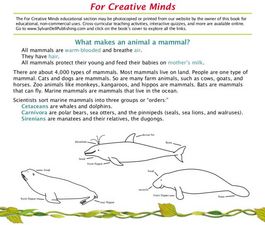

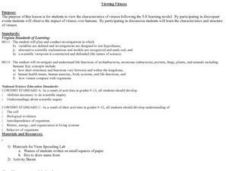




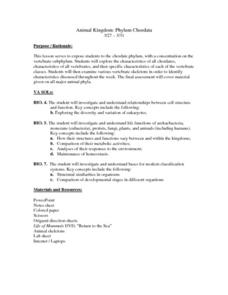




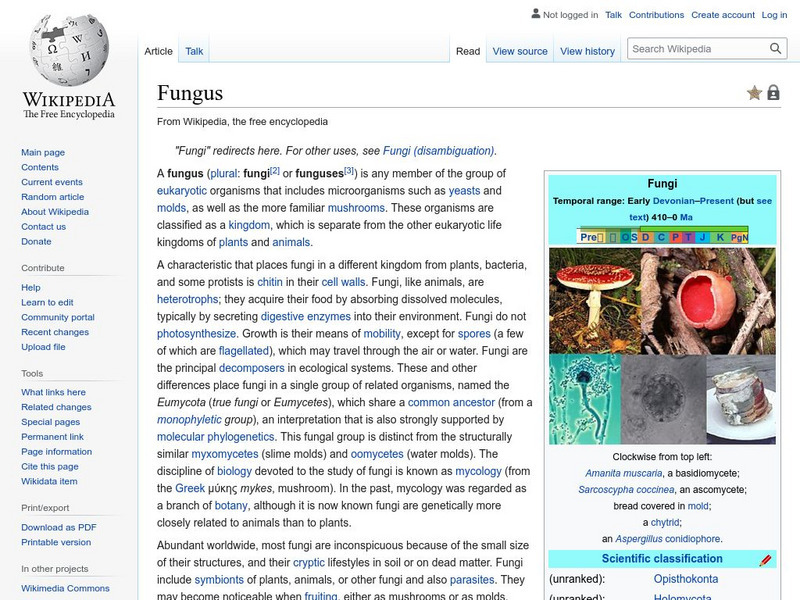
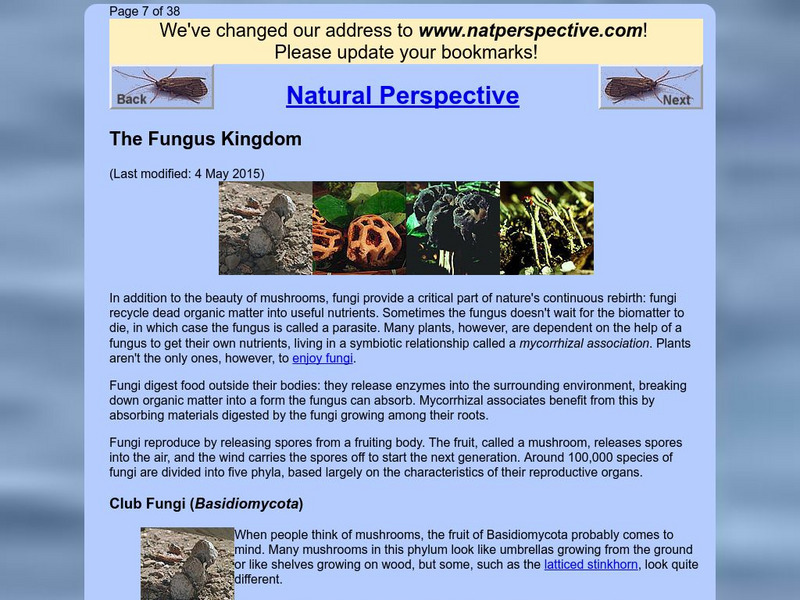
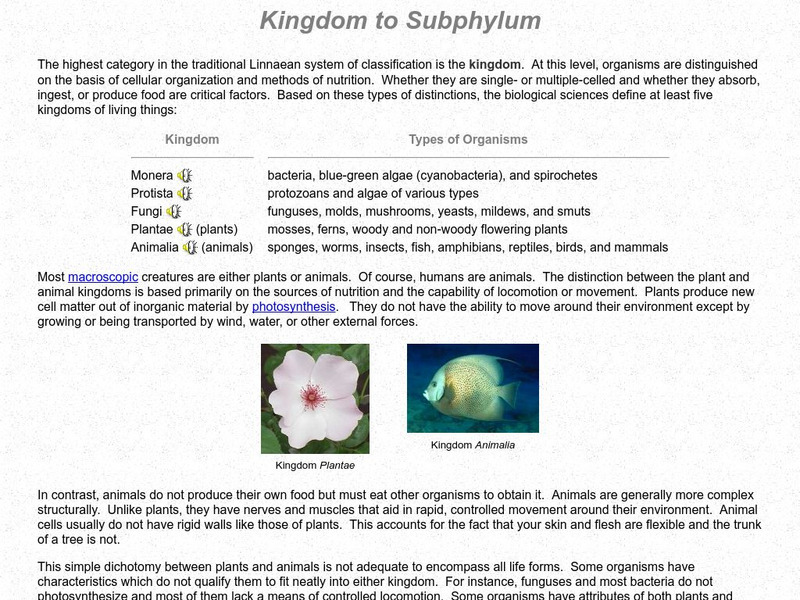






![Panhandle Area Educational Consortium: The Six Kingdoms of Life [Pdf] Handout Panhandle Area Educational Consortium: The Six Kingdoms of Life [Pdf] Handout](https://d15y2dacu3jp90.cloudfront.net/images/attachment_defaults/resource/large/FPO-knovation.png)